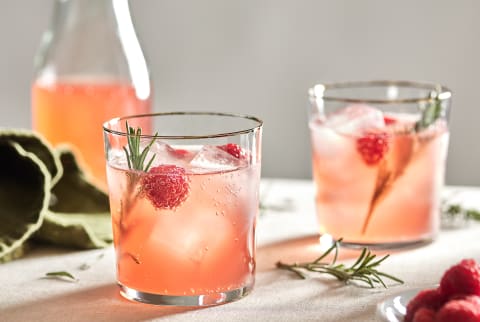Advertisement
How To Grow A Bartender's Garden: 6 Plants For Your Cocktail Or Mocktail


You know the feeling: The end of the day rolls around and you're craving a fancy beverage—only to realize you're missing a key ingredient, the fresh herbs!
Growing your own herbs and flowers can help you bring all your cocktail or mocktail dreams to life, any time. Starting an at-home garden will also save you plastic packaging waste, help you cut down on food waste (because using up a grocery store bunch quick enough can be a challenge), and give you control over how your food is grown.
Bonus points, it's easier to do than you think: Here are some of the best low-maintenance plants for your indoor or outdoor bartender's garden, plus some starter recipes to stir, shake, or steep them into:
Sage
Ashley Renne Nsonwu, host of the Smart Healthy Green Living show Ashley Renne, loves the way that savory sage pairs with bright fruits like cherries.
And this is one herb that's easy to grow from a cutting: Instead of investing in seeds or a starter plant, simply cut a few pieces off your organic sage from the store. "In most cases, all you need to do is make an angled cut on the stem of your herb and remove the lower leaves," Nsonwu explains. "Place the cuttings in a cup of water with the remaining leaves above the waterline, and set it on a sunny windowsill. Change the water every couple of days, and watch your herbs grow." Once it grows roots, you can pot it in well-draining soil to get it ready for cocktails to come.
Drink it in: A Cherry and Sage Whisky Sour
Rose
Beyond smelling fantastic, rose petals also have relaxing and anti-inflammatory properties. "The more fragrant the rose is, generally, the more medicinal it is," Rachelle Robinett, R.H., the founder of herbalism education company Supernatural, tells mbg.
Once you grow your roses to maturity (this is a plant that can thrive in a container or outdoor garden), place their fragrant petals in hot water to brew for five to 10 minutes. Extracting flavor and nutrients from these delicate, paper-thin leaves is pretty quick and easy. Once you have your tea, pour it into an ice cube tray and freeze for a fizzy, slightly floral beverage.
Drink it in: A Lemon, Gin & Rosewater Spritz
Lavender
Lavender falls into the nervine category of herbs that help calm the nervous system (others include lemon balm, chamomile, and valerian). Robinett loves working nervines into nighttime mocktails, as they lend some of the relaxing, peaceful qualities of alcohol—but they'll help your sleep instead of harming it. To get your fresh lavender flowers drink-ready, you can cook them down into a syrup, brew them into a tea, or muddle them into a paste, like in the recipe below.
Drink it in: A Turmeric Lavender Mocktail
Dill
An unexpected cocktail addition, dill complements citrus fruits like grapefruit and lime, which Nsonwu loves. Like most herbs, dill should be pruned regularly to promote growth, so don't be afraid to snip plenty of sprigs for your drink.
"When you allow the herb to grow too tall, you are essentially causing it to start and finish its life cycle, which prevents it from continuing to grow. Harvesting your herbs on a regular basis will keep them in a continued state of growth for as long as possible," Nsonwu explains.
Drink it in: A Cucumber Dill Paloma
Hibiscus
Fresh hibiscus adds a bit of tartness to sweet drinks—and it looks the part, too. Nurture this bright red beauty to life by placing it in bright, direct light and watering it every one to two weeks as needed. (You can find a complete guide to growing hibiscus here.)
Robinett enjoys steeping the dried or fresh flowers into a tea and freezing in ice cubes for cooling summertime mocktails.
Drink it in: A Hibiscus Ginger Fizz
Mint
And of course, any variety of crowd-favorite mint will add a refreshing herbal kick to your drink of choice. You'll want to be a little careful when growing this herb at home because it's a fast and aggressive spreader. Place it in its own container or small plot to keep it from overtaking your other plants. Mint doesn't require much light, making it a good pick for indoor growers.
Mint's functionally fragrant leaves are packed with antioxidant-rich, antibacterial essential oils, making it another top pick of Robinett's.
Drink it in: A Matcha Mint Mojito